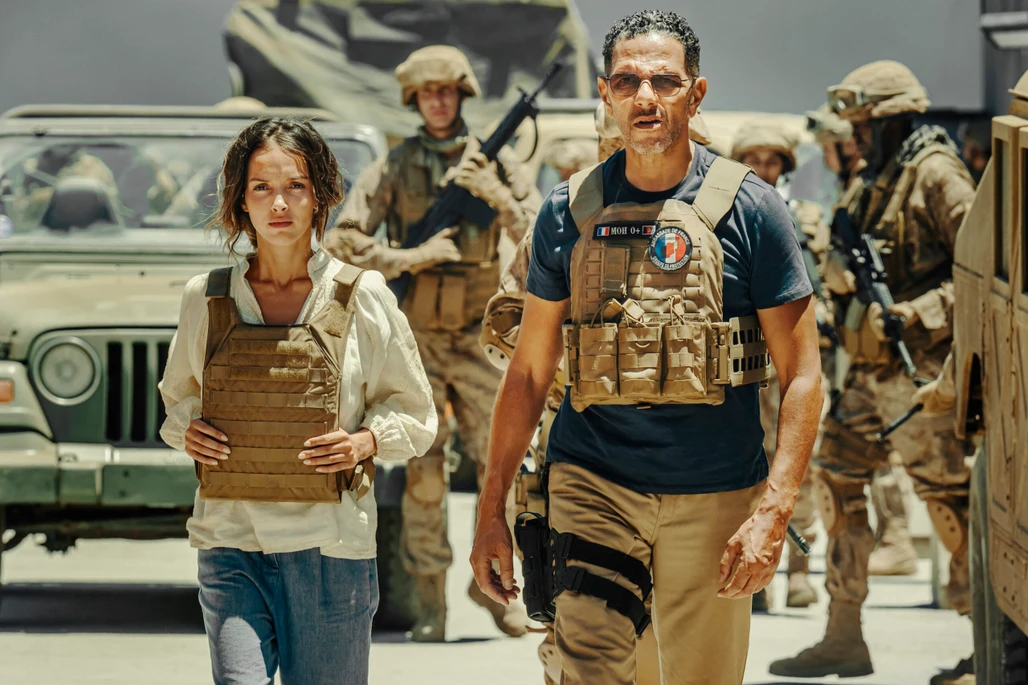Introduction
In August 2021, as the United States and NATO forces withdrew from Afghanistan, the Taliban swiftly advanced, capturing Kabul and plunging the city into chaos. Amidst this turmoil, the French Embassy remained a beacon of hope for many Afghans seeking asylum. The film 13 Days, 13 Nights: In the Hell of Kabul (13 Jours, 13 Nuits), directed by Martin Bourboulon, chronicles the harrowing 13-day mission led by Commander Mohamed Bida to evacuate over 2,800 individuals from the besieged embassy to the safety of Kabul’s airport.
Plot Overview
The narrative unfolds on August 15, 2021, as the Taliban’s rapid advance threatens the capital. Commander Mohamed Bida, portrayed by Roschdy Zem, is tasked with overseeing the security of the French Embassy. Trapped within the compound alongside over 500 civilians, including French nationals and Afghan allies, Bida faces the daunting challenge of orchestrating their evacuation amid the escalating danger.
With the Kabul airport serving as the only viable exit point, Bida collaborates with Eva, a French-Afghan humanitarian worker played by Lyna Khoudri. Together, they navigate the treacherous path from the embassy to the airport, contending with Taliban checkpoints, the unpredictability of the crowds, and the constant threat of violence. The film captures their relentless efforts, underscoring themes of leadership, resilience, and the moral complexities of wartime decisions.
Historical Context and Real-Life Inspiration
The film is adapted from Commander Mohamed Bida’s memoir, 13 Jours, 13 Nuits: Dans l’Enfer de Kaboul, which details his firsthand experiences during the Kabul evacuation. Having spent five years in Afghanistan, Bida was preparing for retirement when the situation in Kabul rapidly deteriorated. His account provides invaluable insight into the challenges faced by foreign diplomats and military personnel during the chaotic withdrawal.
The evacuation operation, known as Operation Apagan, was a massive international effort involving multiple countries. France, under the leadership of President Emmanuel Macron, committed to evacuating its citizens and Afghan collaborators. The mission was fraught with logistical hurdles, diplomatic negotiations, and the ever-present threat of Taliban interference.
Cinematic Approach and Direction
Director Martin Bourboulon, known for his work on The Three Musketeers (2023), brings a meticulous and immersive approach to the film. The screenplay, co-written with Alexandre Smia and Trân-Minh Nam, emphasizes realism and emotional depth. The film’s pacing mirrors the urgency of the evacuation, with moments of intense action interspersed with quieter, reflective scenes that delve into the characters’ psyches.
The cinematography by Nicolas Bolduc employs handheld cameras and close-up shots, placing the audience in the midst of the action. This technique enhances the sense of immediacy and danger, allowing viewers to experience the tension and uncertainty alongside the characters.
Themes and Character Analysis
Leadership and Responsibility
At the heart of the film is Commander Bida’s unwavering commitment to his mission and the people under his protection. His leadership is characterized by decisiveness, empathy, and a deep sense of duty. As the situation becomes increasingly dire, Bida’s decisions often carry life-or-death consequences, highlighting the burdens of command in crisis situations.
Humanitarianism Amidst Chaos
Eva’s character embodies the spirit of humanitarianism. Torn between her professional obligations and personal ties to Afghanistan, she becomes an essential ally to Bida. Her presence underscores the importance of compassion and solidarity in times of conflict.
Moral Ambiguities
The film doesn’t shy away from depicting the moral dilemmas faced by the characters. The decision to negotiate with the Taliban for safe passage raises questions about ethics, survival, and the compromises made during wartime. These complexities add depth to the narrative, prompting viewers to reflect on the nuances of conflict.
Critical Reception
Upon its release, 13 Days, 13 Nights garnered a mix of reviews. Critics praised the film’s commitment to historical accuracy and the compelling performances of the cast. Roschdy Zem’s portrayal of Commander Bida was particularly lauded for its depth and authenticity. However, some reviewers noted that the film’s pacing occasionally faltered, and certain character developments felt underexplored.
In Spain, the film received positive reviews, with El País describing it as an “effective thriller” that offers a poignant look at France’s role during Kabul’s fall. The Spanish publication highlighted the film’s blend of political drama, action, and Western elements, noting its tribute to the humanitarian mission that successfully evacuated over 2,700 individuals.
Cultural and Political Significance
13 Days, 13 Nights serves as a cinematic reflection on the geopolitical ramifications of the Afghanistan withdrawal. It delves into the complexities of international diplomacy, the challenges of military operations in urban environments, and the personal sacrifices made by those involved in humanitarian efforts.
The film also prompts discussions about the broader implications of foreign interventions and the responsibilities of nations toward those who aid them. It serves as a reminder of the human cost of geopolitical decisions and the enduring impact on individuals caught in the crossfire.
Conclusion
13 Days, 13 Nights: In the Hell of Kabul is a poignant and gripping portrayal of a pivotal moment in recent history. Through its compelling storytelling, strong performances, and realistic depiction of events, the film offers an intimate look at the challenges faced during the Kabul evacuation. It underscores themes of leadership, humanity, and the complexities of wartime decisions, making it a significant contribution to contemporary war cinema.

